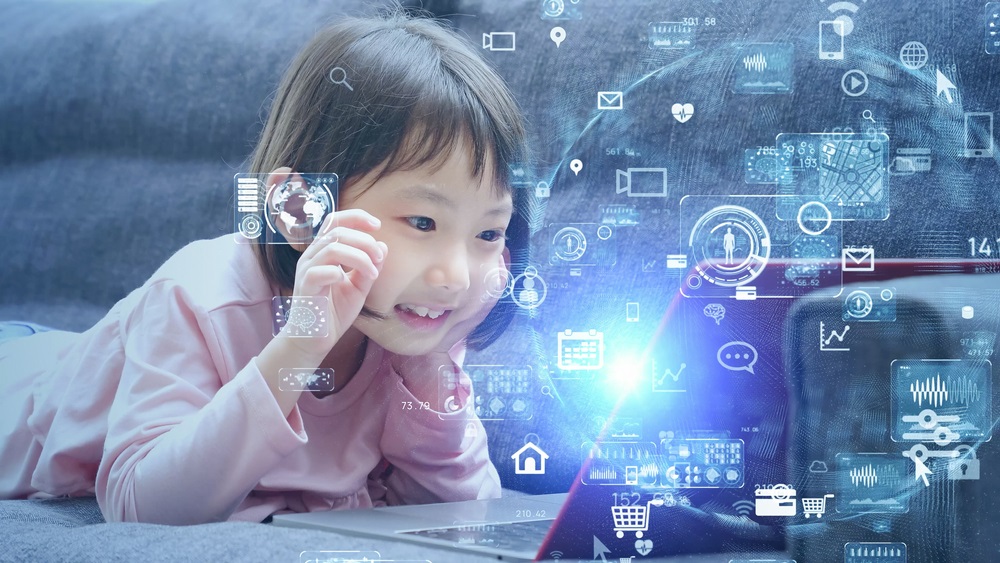
How Does Artificial Intelligence Affect the Creativity and Mental Development of Children?
In recent years, artificial intelligence has become one of the technologies that significantly affect our lives, as its use has spread in all areas of life, from industry and agriculture to medicine, entertainment, and others.
The development of AI technology day after day and its widespread spread in our lives indicates its ability to bring about a technological revolution that will change priorities, goals and plans.
Children are an essential part of our present and future, so it is necessary to know its impact on their lives and future, and to make sure to teach them its basics.
Let’s find out how Artificial Intelligence affects the creativity and mental development of children!
How does AI technology affect children’s lives?
Teaching artificial intelligence helps children better understand the world they live in and improves their ability to think critically and solve problems, as the technology requires users to think systematically and work to solve problems in a logical and effective way. This helps children to develop their mental abilities. It also helps them interact with technology better.
The technology requires users to understand how to use it safely and effectively and maintain their privacy. And learning these educational and social skills is especially important in this modern digital age.
There are many social media and applications that children use on a daily basis. Technology can help children learn foreign languages and improve their language abilities in general. Technology can also be used to enhance self-education and interaction with classmates and around the world.
How can children learn AI technology safely and responsibly?
Modern technology is developing rapidly in this ever-changing digital world. It needs supervision from parents and educators to tell children about the dangers of technology and how to maintain their safety on the Internet to ensure safe and responsible interaction with this technology. This can be done through the following steps:
Teach the AI basics: Parents and educators must have a simple knowledge of AI and how it works, so that they can teach the basics to children and explain basic ideas and concepts smoothly.
Constant knowledge: Parents and teachers must be aware of the latest developments in technology and update their knowledge continuously, so that they can better guide children.
Encourage children to interact safely: Parents and educators should encourage children to interact safely and responsibly with technology, by keeping them in contact with family and friends only, not disclosing personal information on the Internet, and making sure to use basic computer protection programs.
Supervision and control: Parents and teachers must supervise and monitor children’s use of technology, ensure that they use it in a correct and responsible manner, and direct them if they need to.
Determine appropriate activities: Parents and teachers must select appropriate activities for children, such as downloading educational and interactive games that enhance children’s mental and social skills.
Collaborate with schools: Parents can collaborate with schools to enhance AI education for children, by working with teachers to identify appropriate activities and provide training and support.
What are the Most Prominent Modern Techniques That can Help Kids Learn About AI?
Artificial intelligence is one of the modern technologies that are used in all fields, but since the focus of our conversation is on children, let us talk about the entertainment field. AI can help improve the electronic gaming experience for children and make it more fun, exciting and educational.
Nowadays, there are many electronic games that use AI techniques, and these games include intelligence games, adventure games, and others. These games give children the opportunity to develop their mental and social skills in a fun and entertaining way. For example, AI can be used in intelligence games to analyze player performance and provide appropriate challenges according to their level. AI technology can also be used to provide a personalized gaming experience for each player according to his level of knowledge and skills.
Modern AI techniques can also be used in adventure games to make them more realistic and exciting, thus motivating children to interact in a more exciting way and encouraging them to develop their social skills such as cooperation and communication.
Role-playing games that use artificial intelligence techniques give children the opportunity to experience realistic personal life in an enjoyable way, and thus help develop the child’s social and professional skills in an interesting way.
Electronic games that use AI also contain educational aspects, as they can be used to design games to teach children language in an interactive and fun way. In addition to designing games that help children learn scientific and mathematical concepts, and encourage them to explore and experiment in an innovative and interesting way. Also designing apps and games improve communication skills, social interaction and learning difficulties, and motivate children to develop them.
What are the basic steps to follow to teach artificial intelligence to children?
Teaching artificial intelligence to children is an important challenge in the era of modern technology, but by using the appropriate steps and the correct methodology, this goal can be successfully achieved, provided that education is in an interesting, fun and motivating framework. Following steps can help you teach artificial intelligence to children:
Understanding the concept of artificial intelligence: Teachers and parents should introduce children to the concept of AI and explain what it is and its importance in daily life.
Using educational games: Educational games can be used that enhance children’s understanding of the concept of artificial intelligence and learn to use it. These games can be fun and interesting and encourage children to learn more.
Applying AI technology in their daily lives: The concepts of AI can be applied in children’s daily lives, by using smart devices, learning from their personal experiences, analyzing various data and information, and applying them in different fields, such as robotics and machine learning.
Using interactive media: Various interactive media such as videos and educational materials designed in an attractive and interesting way should be used, and this helps to better understand the concepts.
Encouraging curiosity and discovery: Encourage children to be curious and discover in the field of artificial intelligence. Ask questions, challenges and interactive projects that encourage children to think creatively and find new solutions.
Motivating self-learning: Motivate children to self-learning and give them enough space to explore and experiment. Encourage them to search, inquire and learn through the Internet and available resources.
Motivation and rewards: Motivate children and give reward when they achieve successes in learning artificial intelligence, in order to encourage them to continue learning and improving.
Ethics and digital safety training: Teach children digital ethics and safety, in order to promote safe and responsible interaction with technology and avoid potential risks.





